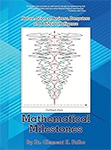Clement E. Falbo (Zimbabwe) | MATHMATICAL MILESTONES
Dr. Clement E. Falbo provides food for thought in an exquisite elucidation of mathematics

Clement Falbo Zimbabwe
Upon his retirement in 1999, he and his wife, Jean Ann Falbo, served in the U. S. Peace Corps in the African Nation of Zimbabwe. Together they taught high school students’ mathematics and science.
There is a sense in which mathematics can be defined as a house with a library of collected problems, solved and unsolved. In addition, this library contains treatises on formulas and methods that might be worth applying to future problems. It also includes alcoves where visitors can come and sit and try to get insights for attacking problems of their own makings or those found in the library. They can write up their results and keep them secret, as Carl Friedrich Gauss did in the 1800s with some of his work (“Few but ripe” was his motto), or they could put them up on the shelves (publish them) for future visitors. Everyone is welcome to the house of Mathematics.
“Anyone reading this book will learn something exciting and novel ways of viewing familiar concepts. Falboís’ short chapter on calculus is lively and entertaining, even including a proof of the fundamental theorem. A unique feature of this book is the way that Clem traces the history of Game Theory and Operations Research from Jiuzhang Suanshu (300 BCE) in China to Seki Kowa (1683 CE) in Japan to Gauss and Jordan in Germany in the 19th Century and all the way to Von Neumann, Morgenstern and Dantzig in the 20th century. His chapters on matrix applications and operations research provide a readily accessible introduction to the powerful Simplex Algorithm. The parts of the book discussing logic and game theory show us where Artificial Intelligence comes from. The book appropriately ends with a chapter, “A Crisis in Mathematics,” relating how Kurt Godel (1931) dashed the hopes of mathematicians to have a discipline that was both complete and consistent,” said Professor Ken Ross of Mathematics Department in The University of Oregon.
The Reading Glass Books will showcase Mathematical Milestones at the London Book Fair, taking place from April 18 to 20, 2023, in Olympia, London. Dr. Falbo’s book will be featured at The Reading Glass Books.
•

No comments yet.
Add your comment